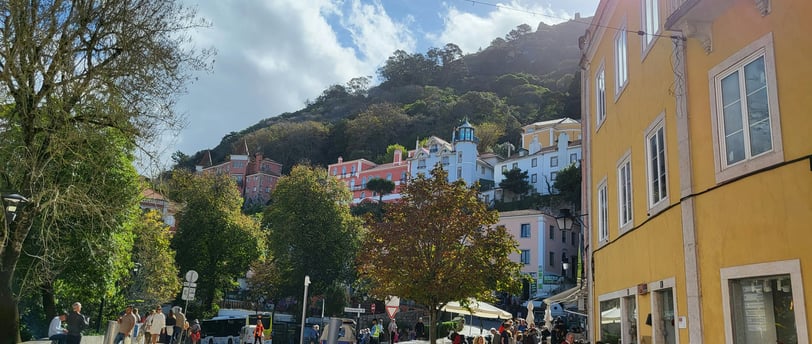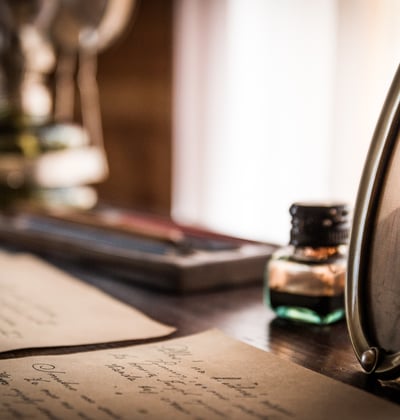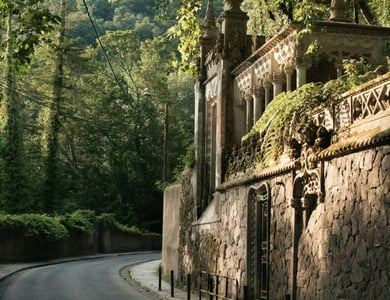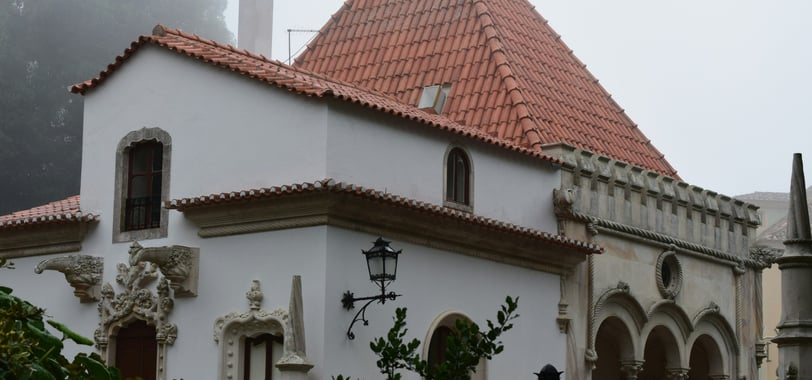The Lost Letters of Sintra


Some places are not meant to be destinations; they are meant to be whispers. Sintra is such a place—a town not visited, but stumbled upon, as if it had been waiting for you all along. It hides in the folds of Portugal’s mist-draped hills, where time does not run forward but lingers, curling in on itself like an old letter left unfinished.
I arrived in Sintra on an autumn afternoon, the sky the color of damp parchment. The train from Lisbon had carried me through rolling fields and shadowed valleys, until the air changed—cooler, denser, laced with the scent of pine and rain-damp stone. The moment I stepped onto the platform, it felt as though I had walked into a place between places, a threshold where the past had not fully departed and the present had not quite arrived.
My guesthouse sat at the foot of the hills, a small, ivy-clad building where the windows remained perpetually misted. The landlady, a woman with hair the color of candle smoke, handed me a brass key with a single instruction: "Do not close the window at night. Sintra does not like to be shut out."


The room was small but warm, smelling faintly of old paper and jasmine. A writing desk stood near the window, and in its drawer, I found something unexpected—a stack of yellowed letters, bound together with a faded blue ribbon. The ink had bled slightly, as if touched too many times by damp fingers. The first letter read:
"My love, I waited for you at the Moorish Castle, where the mist swallowed my voice before it could reach you. I will wait again tomorrow."
There was no name, no date, only the soft curve of longing pressed into each word. I ran my fingers over the paper, half-expecting the ink to smudge beneath my touch. The past, in Sintra, did not feel like something gone—it felt like something still breathing, waiting just beyond the mist.
It was impossible not to look for them, these vanished lovers whose words had been left behind. I wandered through Sintra as if following their footprints, though they led only into uncertainty. The streets twisted unpredictably, folding into staircases that led nowhere, paths that curved away into the green depths of the hills.
At Quinta da Regaleira, I descended into the Initiation Well, my footsteps echoing down the spiral stone walls. The air was thick, almost sentient. For a moment, I imagined a figure standing at the bottom—watching, waiting. When I reached the last step, there was only silence and the distant sound of water trickling through unseen cracks.
At the Palácio da Pena, the mist rolled in just before sunset, swallowing the towers until they seemed to float, unanchored. I watched as a woman in a dark coat lingered near the edge of the terrace, her back to me, as still as a statue. When I turned to leave, I heard footsteps behind me. But when I looked back, there was only the wind moving through the empty space where she had been.


Over the next few days, I read each letter in the drawer, tracing the arc of a love story unfinished. Some were brief:
"You once told me Sintra was made of longing. I think you were right."
Others carried the weight of time:
"I have tried to leave this place, but I find myself always circling back, as if the roads here do not lead outward, only inward."
One letter simply said:
"I think I am disappearing."
On my last evening, I took the stack of letters with me and climbed to the ruins of the Moorish Castle. The wind curled around the stones, carrying the scent of the distant sea. I read the final letter aloud to the empty battlements:
"If you ever return to Sintra, you will find me here, between the mist and the memory of your footsteps."
As I finished, the air shifted—a breath of wind, the sudden hush of leaves. I turned, expecting to see someone standing behind me. But there was no one. Only the outline of the town below, softened into watercolor by the evening fog.
I left the letters there, wedged into the crevice of an old stone wall. Perhaps the one who had written them would find them again. Perhaps they already had.


On the morning of my departure, I looked back at Sintra from the train window, watching as the mist wove itself through the trees. I wondered how many stories had been left behind in this town—how many love letters had been written but never sent, how many lovers had waited but never reunited.
Perhaps Sintra is not a place where things are lost. Perhaps it is where they remain, suspended in the air, in the fog, in the ink of letters never delivered.
As the train carried me away, I felt something shift—a presence lifting, a whisper fading. But in my pocket, I found a single scrap of paper. A letter I did not remember taking. It read:
"Some stories do not end. They simply wait to be found again."
Sintra lingers like an unfinished story, its whispers carried by the mist. But to truly understand its soul, step deeper into its labyrinth of longing in Destinations — "Sintra: The House of Mists and Lost Lovers."
Yet Sintra is not just a place of memories—it is a landscape that breathes, a stage where the past and present entwine. To witness how its myths and legends unfold in the rhythms of modern-day festivals, explore “Sintra 2025: Myths, Literature, and Cultural Festivals in Portugal’s Enchanted Hills.”
✉️ Contact:
Curated by TrueTrip Hub |
© 2025 Invisible Atlas — All rights reserved.
Invisible Atlas
Journey Beyond the Visible
invisible.atlas@truetriphub.com
